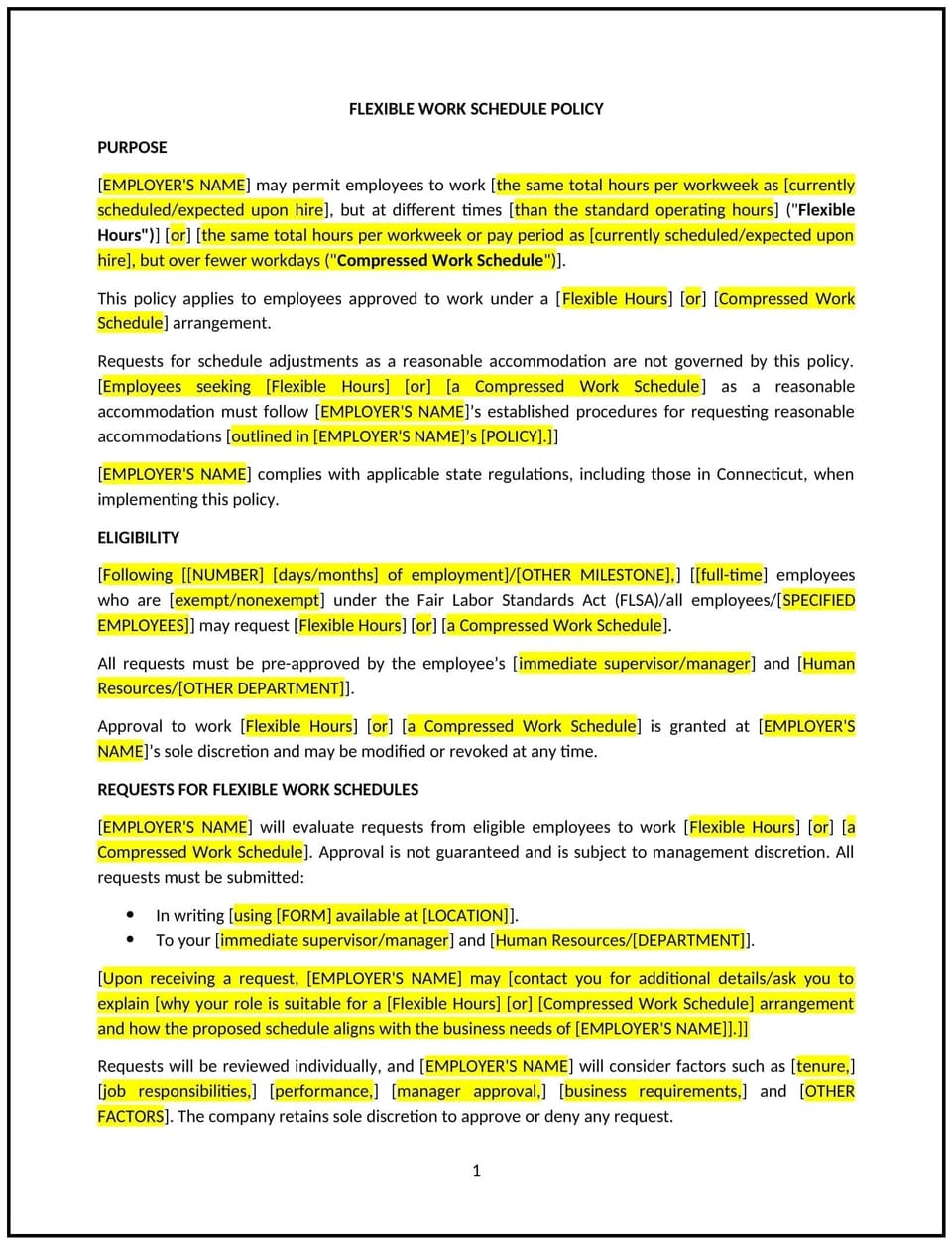Flexible work schedule policy (Connecticut): Free template

Flexible work schedule policy (Connecticut)
A flexible work schedule policy helps Connecticut businesses offer employees more control over their working hours, while still ensuring that business needs are met. This policy outlines the guidelines for flexible scheduling options, such as staggered hours, compressed workweeks, or remote work, and provides a framework for balancing employee preferences with the company’s operational requirements.
By implementing this policy, businesses can improve employee work-life balance, boost productivity, and attract and retain top talent in a competitive job market.
How to use this flexible work schedule policy (Connecticut)
- Define eligibility: Specify which employees are eligible for flexible work schedules, such as full-time employees, employees in specific roles, or those who meet certain performance criteria.
- Set flexible work options: Outline the types of flexible work schedules available, such as flexible start and end times, compressed workweeks (e.g., four 10-hour days), or remote work arrangements.
- Establish approval procedures: Specify the process for requesting a flexible schedule, including how employees should submit requests, the timelines for approval, and any necessary documentation or justification.
- Address business needs: Clearly define how employees’ flexible schedules will be balanced with the company’s operational needs, ensuring that productivity and team collaboration are not compromised.
- Monitor and evaluate: Set guidelines for tracking employees' work hours, ensuring that all work is completed on time and that employees remain engaged and productive while on flexible schedules.
Benefits of using this flexible work schedule policy (Connecticut)
This policy offers several benefits for Connecticut businesses:
- Increases employee satisfaction: Offering flexible work schedules improves work-life balance, which can lead to higher job satisfaction and improved morale.
- Boosts productivity: Flexible work arrangements can enhance employee focus and productivity by allowing them to work during their most effective hours or in a more comfortable environment.
- Attracts and retains top talent: Providing flexibility can make the business more attractive to prospective employees and increase retention rates among current staff.
- Reduces absenteeism: Flexible scheduling allows employees to better manage personal commitments, reducing the need for unscheduled time off.
- Supports diversity and inclusion: Flexibility can help accommodate employees’ various needs, including those with caregiving responsibilities, disabilities, or other life circumstances.
Tips for using this flexible work schedule policy (Connecticut)
- Communicate clearly: Ensure that employees understand how to request flexible work arrangements, the types of schedules available, and any limitations or conditions that apply.
- Provide clear guidelines: Define expectations around availability, communication, and collaboration when employees are working flexibly, to ensure productivity is maintained.
- Set measurable goals: Use performance metrics or project deadlines to ensure that employees working flexible schedules continue to meet company expectations.
- Encourage feedback: Regularly gather feedback from employees using flexible work schedules to identify areas for improvement and ensure the policy is working effectively for both the employees and the business.
- Review periodically: Update the policy regularly to reflect any changes in Connecticut laws, business needs, or employee feedback to maintain its effectiveness and relevance.
Q: How does this policy benefit my business?
A: The policy helps improve employee morale and productivity by offering flexibility, which can reduce turnover, improve work-life balance, and attract top talent. It also contributes to a more efficient, happier workforce that can meet company goals.
Q: Who is eligible for a flexible work schedule?
A: Eligibility typically depends on the nature of the role, business needs, and the employee's ability to maintain performance and meet deadlines. The policy should outline which roles are suitable for flexible schedules and any performance criteria.
Q: How should employees request a flexible work schedule?
A: Employees should submit a formal request to their manager or HR, outlining their desired flexible schedule, how it fits with their job responsibilities, and any other relevant details. The request will be reviewed and approved based on business needs.
Q: Can employees work from home under this policy?
A: The policy may allow for remote work, depending on the nature of the job and business requirements. Employees should follow the established process to request remote work and clarify how their responsibilities can be fulfilled while working remotely.
Q: How often should this policy be reviewed?
A: The policy should be reviewed annually or whenever there are changes to Connecticut laws, business practices, or employee feedback that could impact the policy's effectiveness and fairness.
This article contains general legal information and does not contain legal advice. Cobrief is not a law firm or a substitute for an attorney or law firm. The law is complex and changes often. For legal advice, please ask a lawyer.


